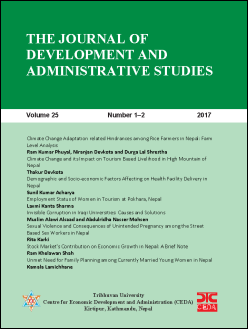How Homogenous are the Madhesis? Implications for Inclusive and Affirmative Agendas
DOI:
https://doi.org/10.3126/jodas.v24i1-2.19665Keywords:
Tarai/Madhesi, Ethnicity, Inclusion, Exclusion, InequalityAbstract
Ethnicity, social inclusion/exclusion and inequality have been much more important and also equally debatable issues in contemporary Nepal. Some scholars (Bhattachan, 2009, 1995; Gurung, 1997; Gurung, 2012; Lawoti, 2005, 2012; Mabuhang, 2012) argue Bahuns, particularly hill Bahuns is the most privileged group with highest access to resources and opportunities and all other non-Brahmans such as Janajatis, Dalits, Madheshi, Muslims, and so on are the most deprived/excluded groups with least access to resources and opportunities. This paper, in contrast, based on NSII(2014) data, argues that Madhesis is neither a single nor a homogeneous group rather it is a broader caste/ethnic category which includes a number of Tarai/Madhesh caste/ethnic groups distinctly different from each other in terms of education, health, economy and politics. Some caste/ethnic groups, within Tarai/Madhesh groups or Madhesis, have better access to resources and opportunities and other Tarai/Madhesh groups have poor access to resources and opportunities. This kind of intra-group inequality can also be observed within all caste/ethnic groups of Tarai/Madhesh; Tarai Brahman/Chhetri, Tarai Dalit, Tarai Janajati, other Tarai Castes, and Muslims including heterogeneous Bahuns (Gautam, 2015). Therefore, Madhesis, as broader Tarai/Madhesh caste/ethnic group, is neither a single nor a homogeneous group rather it is a heterogeneous category with wider inter-group inequality in terms of access to resources and opportunities.
The Journal of Development and Administrative Studies (JODAS), Vol. 24 (1-2), pp. 25-38
Downloads
Downloads
Published
How to Cite
Issue
Section
License
The copyright of the accepted articles is reserved by the Centre for Economic Development and Administration (CEDA), Tribhuvan University (TU). No part of the article published in this journal should be reproduced except provided by the law currently in force without the written consent of the centre.




